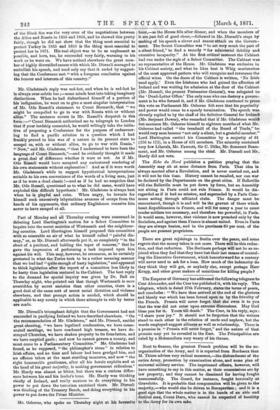Mr. Osborne, who spoke on Thursday night at his favourite
hour,—as the House fills after dinner, and when the members of it are just full of good cheer,—followed in Mr. Disraeli's steps by making of his speech a clever and coarse attack on the Govern- ment. The Secret Committee was "to act very much the part of a silent friend," to find a remedy "fop ministerial debility and executive incapacity." At the first critical moment the Cabinet had run under the mgis of a Select Committee. The Cabinet was. no representative of the House. Mr. Gladstone was exclusive in his Cabinet society, and what he likes best is Whig marionettes. of the most approved pattern who will recognize and reverence the- official wires. On the doors of the Cabinet is written, 'No Irish, need apply.' Even the Irishman who had gained the affection of; Ireland and was waiting for admission at the door of the Cabinet. (Mr. Monsell, the present Postmaster-General), was relegated to. the Dead-Letter Office.' The only man who can destroy a govern- ment is he who formed it, and if Mr. Gladstone continued to press. this vote on Parliament Mr. Osborne felt sure that his popularity and power would come to a speedy termination. The speech was. cleverly replied to by the chaff of the Solicitor-General for Irelandi (Mr. Serjeant Dowse), who remarked that if Mr. Gladstone wouldl but sentence Mr. Osborne himself to eighteen months of what Mr. Osborne had called "the treadmill of the Board of Trade," he- would very soon become "not only a silent, but a grateful member."' Lord Hartington carried his Committee by a majority of 81 (256 to 175), in a House of 431 members. The minority contained very few Liberals, Mr. Fawcett, Sir C. Dilke, Mr. Somerset Beau- mont, and Mr. Osborne among the chief. Mr. Disraeli and Mr.. Hardy did not vote.


































 Previous page
Previous page